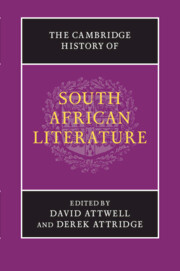Book contents
- Frontmatter
- Introduction
- PART I ORATURES, ORAL HISTORIES, ORIGINS
- PART II EXPLORATION, EARLY MODERNITY AND ENLIGHTENMENT AT THE CAPE, 1488–1820
- PART III EMPIRE, RESISTANCE AND NATIONAL BEGINNINGS, 1820–1910
- PART IV MODERNISM AND TRANSNATIONAL CULTURE, 1910–1948
- PART V APARTHEID AND ITS AFTERMATH, 1948 TO THE PRESENT
- 19 The fabulous fifties: short fiction in English
- 20 Writing in exile
- 21 Afrikaans literature, 1948–1976
- 22 Afrikaans literature after 1976: resistances and repositionings
- 23 The liberal tradition in fiction
- 24 Black Consciousness poetry: writing against apartheid
- 25 Popular forms and the United Democratic Front
- 26 Writing the prison
- 27 Theatre: regulation, resistance and recovery
- 28 The lyric poem during and after apartheid
- 29 Writing and publishing in African languages since 1948
- 30 Writing the interregnum: literature and the demise of apartheid
- 31 Rewriting the nation
- 32 Writing the city after apartheid
- PART VI SOUTH AFRICAN LITERATURE: CONTINUITIES AND CONTRASTS
- Index
- References
20 - Writing in exile
from PART V - APARTHEID AND ITS AFTERMATH, 1948 TO THE PRESENT
Published online by Cambridge University Press: 28 January 2012
- Frontmatter
- Introduction
- PART I ORATURES, ORAL HISTORIES, ORIGINS
- PART II EXPLORATION, EARLY MODERNITY AND ENLIGHTENMENT AT THE CAPE, 1488–1820
- PART III EMPIRE, RESISTANCE AND NATIONAL BEGINNINGS, 1820–1910
- PART IV MODERNISM AND TRANSNATIONAL CULTURE, 1910–1948
- PART V APARTHEID AND ITS AFTERMATH, 1948 TO THE PRESENT
- 19 The fabulous fifties: short fiction in English
- 20 Writing in exile
- 21 Afrikaans literature, 1948–1976
- 22 Afrikaans literature after 1976: resistances and repositionings
- 23 The liberal tradition in fiction
- 24 Black Consciousness poetry: writing against apartheid
- 25 Popular forms and the United Democratic Front
- 26 Writing the prison
- 27 Theatre: regulation, resistance and recovery
- 28 The lyric poem during and after apartheid
- 29 Writing and publishing in African languages since 1948
- 30 Writing the interregnum: literature and the demise of apartheid
- 31 Rewriting the nation
- 32 Writing the city after apartheid
- PART VI SOUTH AFRICAN LITERATURE: CONTINUITIES AND CONTRASTS
- Index
- References
Summary
Nineteen years I’ve roamed the continents / Renting one glasshouse after another / whence I’ve gazed and gazed / upon the wilderness of exile / all around me . . . / still turning round in circles / sowing seed / on borrowed land / for crops we’ll always have to leave behind.
(Es’kia Mphahlele, ‘A Prayer’)The initial impetus for exile by a South African writer was provided Peter Abrahams's decision in 1939 to skip the country in order to live a more ful-filling life in Britain. Abrahams's poignant ending of his memoir, Tell Freedom (1954), at a time when he is barely 21, touches on the core reasons why autobiographical writing seems to be especially made for the South African situation: alienation. Well before apartheid became state policy in May of 1948, the alienating effects of living in a racialising world touched on people such as Abrahams, presenting physical exile as a better option. He writes: ‘I needed, not friends, not gestures, but my manhood. And the need was desperate … Also, there was a need to write, to tell freedom, and for this I needed to be personally free’ (Tell Freedom, p. 311, emphasis added). The reader is drawn to a sense of emasculation that the alienated youth feels, as much as to the sense of a quest to be free by any means possible in order to be able to speak truth to power. He was actually shunned for being ‘a dangerous radical’ by newspapers such as Bantu World and Umteteli wa Bantu and, as he narrates, he was at one point ‘homeless and near starvation’ (Return to Goli, p. 14). In a sense, Abrahams's needs for exile provide the template within which to view much writing from the exilic condition: a repressed personality suffering from insistent infantilisation through racism and a sense of personhood.
- Type
- Chapter
- Information
- The Cambridge History of South African Literature , pp. 410 - 428Publisher: Cambridge University PressPrint publication year: 2012

